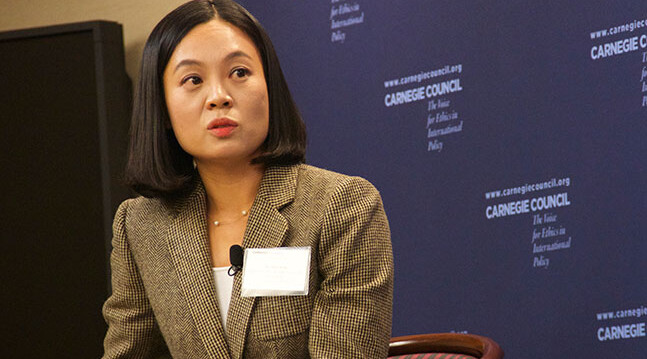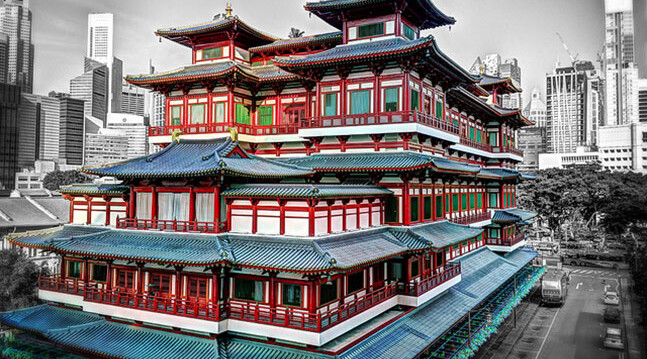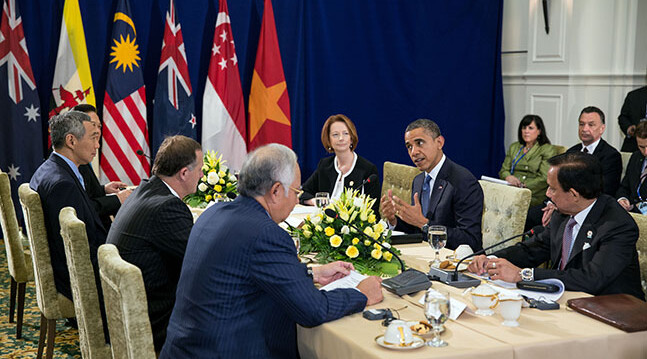Based on a paper presented to the Carnegie Council's Global Ethics Fellows Fifth Annual Conference, "An Ethical Dialogue between Asia and the West: Philosophical Traditions, Moral Contentions, and the Future of US-Asia Relations." The Conference took place in New York City, October 20-23, 2015.
Abstract
In this essay, Jiyoung Song argues that while there are notable differences in human rights thinking between the East and the West, the 21st century is witnessing a norm convergence among conservative elites in both regions. She explains how ideas have converged since the events of 9/11. After 9/11, human rights ideas in the West retreated and more focus has been placed on national security, strict border control, censorship, and social harmony. The geographical, national, or ethnic East-West division in human rights thinking is increasingly irrelevant and, instead, multiple layers of horizontal solidarity, cutting across socio-economic classes and political affinities, have been formed through global networks. While conservative political elites prioritize national security over individual freedom across Asia and the West, liberals in both regions have been significantly marginalized.
Introduction
In 1989, Francis Fukuyama declared in The End of History that the rivalry between liberal democracy and communism ended with the victory of liberal capitalist democracy. Since the end of the Cold War, however, with the rise of China, a new East vs. West discourse has emerged and focused on different ethics and value systems between the two regions. While some Asian thinkers such as Kishore Mabhubani (2008) celebrate 'the rise of Asia and the decline of the West,' Fukuyama (2011) himself made a U-turn of his 'End of History' thesis and praised the 'value-free' effective governance of China, the position of which he (2013) defended not so convincingly later on. According to his new thesis, good governance does not have to be democratic. While Western conservatives are fascinated by these alternative models in Asia, Western liberals concede to tolerate non-democratic values and regimes.
With the U.S. "pivot to Asia" (or "rebalance" as they later revised it), the U.S. interests in understanding Asian values have mainly focused on Chinese thinking, leaving those of other small Asian countries relatively neglected. Militarily speaking, the U.S. pivot to Asia means strengthening the U.S. alliance with Asia's traditional partners, such as Japan, Australia, South Korea, and the Philippines, through joint military exercises to counterbalance the rise of China and threats from North Korea. Diplomatically, it means renewing relations with other Asian states to make new friends or establish strategic partnerships. Shared norms play an important role in these friend-making decisions. Human rights compose an important area in which to judge state compliance with international standards in rule of law, democracy, and good governance.
Asian Values and Human Rights
Do Asians have a different approach to human rights from the Western understanding of them? The general assertion by Asian authoritarian leaders such as Malaysia's Mahathir and Singapore's Lee Kuan Yew is that Asia prioritizes security and social harmony over individual freedom. Asia's economic success is based on strong authoritarian leadership and state-led economy. The societal structure is hierarchical. Rights and duties are relational; in other words, the king and the subject have different duties and responsibilities towards each other as in other relations like husband and wife or elder brother and younger brother. Asians are hard-working, materialistic, and apolitical. They focus on education and discipline. The Asian values debates in the 1990s have contributed to this line of thinking. Singapore's late Prime Minister Lee Kuan Yew is the prime architect of the Asian Values hypothesis, which is also endorsed by other authoritarian leaders in Asia. Lee is often viewed as an opponent of Western democracy and human rights, and his successors see them as products of Western cultural imperialism.
"Asian Values" are a political invention by authoritarian rulers whose goal is to stay in power and deny political participation and equal opportunities to their liberal, democratic, left-leaning, or green counterparts. Asian values and cultural relativism are used as arguments against the domestic implementation of international human rights standards by conservative elites in Asia. Lee's Singapore has been ruled by one party since independence in 1965 and has the following systems in place: mandatory death penalty for drug trafficking, arbitrary detention under the Internal Security Act, caning as judicial punishment, and strict censorship over the media and free expression. Its ministers frequently sue its own citizens for defamation and recently detained a 16-year-old boy for his Youtube video about Lee.
One way to look at state commitment to human rights is the ratification status of international human rights laws (see below). Overall, Brunei, Burma, Malaysia, and Singapore do not have good records of ratification. When these countries do sign, rights pertaining to women, children, and the disabled are prioritized.
[East Asia and U.S. Ratification of International Human Rights Conventions*]
table.gridtable { font-family: verdana,arial,sans-serif; font-size:12px; color:#333333; border-width: 1px; border-color: #666666; border-collapse: collapse; } table.gridtable th { border-width: 1px; padding: 8px; border-style: solid; border-color: #666666; background-color: #dedede; } table.gridtable td { border-width: 1px; padding: 8px; border-style: solid; border-color: #666666; background-color: #ffffff; }
CERD
(1969)
CCPR (1976)
CESCR
(1976)
CEDAW
(1981)
CAT
(1987)
CRC
(1990)
MWC
(2003)
CRPD
(2008)
United States of America
1994
1992
1994
SOUTHEAST ASIA
Brunei Darussalam
2006
1995
Cambodia
1983
1992
1992
1992
1992
1992
2012
Indonesia
1999
2006
2006
1984
1998
1990
2012
2011
Lao PDR
1974
2009
2007
1981
2012
1991
2009
Malaysia
1995
1995
2010
Myanmar/Burma
1997
1991
2011
Philippines
1967
1986
1974
1981
1986
1990
1995
2008
Singapore
1995
1995
2014
Thailand
2003
1996
1999
1985
2007
1992
2008
Viet Nam
1982
1982
1982
1982
1990
2014
NORTHEAST ASIA
Democratic People's Republic of Korea
1981
1981
2001
1990
2008
Japan
1995
1979
1979
1985
1999
1994
2008
Mongolia
1969
1974
1974
1981
2002
1990
2009
People's Republic of China
1981
2001
1980
1988
1992
2008
Republic of Korea
1978
1990
1990
1984
1995
1991
2008
*As of July 2015. ICCPR=International Covenant on Civil and Political Rights; ICESCR=International Covenant on Economic, Social and Cultural Rights; CRC= Convention of the Rights of the Child; CEDAW=Convention on the Elimination of All Forms of Discrimination Against Women; CERD=International Convention on the Elimination of All Forms of Racial Discrimination; CAT=Convention against Torture and Other Cruel, Inhuman or Degrading Treatment or Punishment; MWC=International Convention on the Protection of the Rights of All Migrant Workers and Members of their Families.
The United States does not have a good record of ratification, either. Beth Simmons argues that for stable democracies, international human rights laws do not matter as their systems have human rights mechanisms already. It is also U.S. exceptionalism and, ironically, U.S. democracy that allows domestic conservative lobby groups to stop Congress from ratifying certain international human rights treaties that advance certain values at the expense of commercial or other interests. Underage soldiers, gun ownership, fundamental religions (not Islamism but some Christian evangelicalism), and undocumented labor migration have been some of the issues and sources of the Americans' internal resistance to fully becoming a member of international human rights society.
9/11 and the Withering Away of Human Rights
Post-9/11 brought consolidated international efforts against extreme Islamic groups and the nation-wide "War against Terror" in the United States. Torture, arbitrary detention, and censorship took place in the name of homeland security, sovereignty, and territorial integrity. The Bush administration sanctioned the torture of prisoners, including children, in offshore detention centers such as Guantanamo Bay. The National Security Agency (NSA) listens in on private conversations of the leaders of their allies and collects personal information from private individuals. The UK's conservative government spies on human rights organizations. Australia pays people smugglers to turn back boats full of refugees and vulnerable economic migrants. These are serious violations of human rights, but they are largely tolerated by ordinary citizens who buy into official narratives of the need for national security.
Facing imminent threats to national security, human rights ideals in the West have withered away in both domestic politics and international affairs. There seems to be norm convergence into conservative agendas in public discourses in the East and the West. Indeed, this division is, however, a mythical construction of conservatives who want to legitimize their political power by building an invisible wall and creating unnecessary rivalry between the two regions. The division creates prejudice, reinforces stereotypes and overgeneralizations, and results in discrimination in ordinary people’s everyday lives.
Open Borders and Norm Convergence
The world is no longer a few blocks of civilizations as Samuel Huntington laid out in the Clash of Civilizations (1989). Free(r) movements and the Internet have revolutionized our way of thinking. Information, trade, education, and technology have contributed to the mutual understanding of different cultures. The 21st century is represented as the complex web of individuals and their ideas. Access to information enables millions of people around the world to communicate and share their ideas with one another. The networks connect people at all levels: the heads of governments at the APEC meetings, defense ministers through the Shangri-La Dialogue, young Asian leaders to Western scholarships through the Asia Foundation or the British Chevening programme, the global LGBTQ caucus and Asian students to Western universities through exchange programs, to name a few.
In the physical world, the relative wealth and freedom of a country attract people from outside of its territorial boundary. It is not just material benefits but also norms that generate this osmosis effect. Democracy, human rights, equal opportunities, and life-style attract many migrant students, workers, and brides from outside the system. Asian students and tourists in Western countries, African migrants in Calais, Syrian asylum seekers in Western Europe, Mexican immigrants in the U.S., Vietnamese wives in South Korea, and Iranian/Afghan refugees off the coast of Australia, are all trying to escape from global wealth inequality, poverty, and political and personal insecurity.
Open borders and free movement, however, also backfire in terms of producing conservative, xenophobic, homophobic, or extreme ideas and networks. They create norm convergence towards more conservative agendas across the globe and build virtual borders within the community. Social media has been the major platform for like-minded nationalists to spread racial stereotypes and hatred against minorities, as well as to mobilize public mass movements. The world has multiple layers of ideas that travel beyond national borders. While global conservatives are united in calling for nationalistic sentiments, liberal internationalists are silent on free movements and individual freedom, if not marginalized within their own society.
Asian Civil Society
Civil society in Asia has been relying on the normative power of international human rights and global liberal networks for their domestic campaigns against their respective authoritarian governments. Competent civil society, along with the rule of law, impartial judges, and independent media, has been the critical element for maintaining the democratic cultures in the Philippines, Thailand, Indonesia, Taiwan, South Korea, and Japan. Strong civil society holds their governments accountable for key socio-economic issues. In recent years, Burma and Cambodia have shown positive signs of growing civil societies that actively engage in human rights campaigns for political and economic reforms, the protection of ethnic minorities, the abolition of forced labor, and increased corporate social responsibilities for transnational corporations. In Singapore, NGOs organized public protests to support the 16-year-old teenage blogger, Amos Yee, who criticized the late Lee Kuan Yew and was subsequently arrested and detained. Activists referred to freedom of expression and the government's responsibility to protect the best interests of the child. Human rights are no longer a product of Western cultural imperialism. Human rights have been internalized among Asian liberals and members of civil society. There are Asian human rights NGOs such as Forum Asia and the Asian Human Rights Commission that campaign against the death penalty, torture, arbitrary detention, forced disappearance, criminalization of homosexuality, and draconian internal security acts. Others call for freedom of expression and migrant workers' rights.
Western liberals have been failing to support and engage with this group of Asian liberals and civil society since 9/11. Their agendas have shifted to focus more on economic issues such as trade liberalization and free trade negotiations with Asia (mainly China). Western liberal communitarians such as Michael Sandel (2012) turn to embracing non-liberal values such as collective social harmony, citizens’ duties, or communitarian justice. In his latest book on political order, Fukuyama abandons his initial claim in the End of History and the Last Man that made him a superstar celebrity academic and becomes an advocate for the China Model and effective governance, a position supported by the Chinese Communist Party (Fukuyama 2015). John Ruggie's Guiding Principles on Business and Human Rights do not engage with civil society and, in fact, he responded angrily to heavy criticism by Amnesty International and Human Rights Watch. While Asian liberals and civil society suffer from domestic repression, unpopular campaigns, and diminishing international networks, Western liberals have skillfully adapted to the rise of China and its Confucian values, utilitarian meritocracy and materialism.
The hope maybe rather found in a new wave of social democracy in the West with Bernie Sanders in the U.S., Jeremy Corbyn in the UK and, to a certain extent, Pope Francis in the Vatican, although their commonality as elderly white men may lack diverse age, ethnic, and gender identities. How this new wave is going to change the current conservative atmosphere in international politics and how Western democrats engage with Asian liberals is not clear. Winning their support, however, would mean a lot to Asian liberals who can regain normative power in their domestic campaigns and changing political cultures.
References
Clinton, Hillary. 11 October 2011. "America's Pacific Century". Foreign Policy (online). Accessed 16 October 2015, http://foreignpolicy.com/2011/10/11/americas-pacific-century/.
Fukuyama, Francis. 2015. Political Order and Political Decay: From the Industrial Revolution to the Globalization of Democracy. New York: Farrar, Straus and Giroux.
Fukuyama, Francis. 2013. What is Governance? Fukuyama Replies. The Governance Blog.
Fukuyama, Francis. 2011. US Democracy Has Little to Teach China. The Financial Times. 17 January 2011.
Fukuyama, Francis. 1992. The End of History and the Last Man. New York: Free Press.
Huntington, Samuel. 1992–3. "The Clash of Civilizations?" Foreign Affairs 72(3): 22–49.
Mahbubani, Kishore. 2008. The New Asian Hemisphere: The Irresistible Shift of Global Power to the East. New York: PublicAffairs.
Sandel, Michael J. 2012. What Money Can't Buy: The Moral Limits of Markets. New York: Farrar, Straus and Giroux.
Simmons, Beth A. 2009. Mobilizing for Human Rights: International Law in Domestic Politics. New York: Cambridge University Press.




